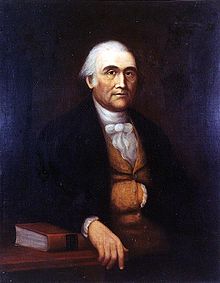Robert Smith (politician, 1757)
Robert Smith (born November 3, 1757 in Lancaster , Province of Pennsylvania , † November 26, 1842 in Baltimore , Maryland ) was an American politician, the 2nd Secretary of the Navy and the 6th Secretary of State .
During the American Revolution, Smith served in the Continental Army and also took part in the Battle of Brandywine . He graduated from Princeton University in 1781 after studying law and began practicing law in Maryland. In 1789 he became president of the Electoral College in Maryland and was a member of the Maryland Senate from 1793 to 1795 . From 1796 to 1800 he was a delegate in the House of Representatives from Maryland (House of Delegates) and was a member of the Baltimore City Council from 1798 to 1801.
US President Thomas Jefferson appointed him Secretary of the Navy on July 27, 1801 . On March 2, 1805, the US Senate confirmed him as United States Attorney General and Jacob Crowninshield took over the office of Secretary of the Navy. After Crowninshield resigned from office, Smith resumed the office of Secretary of the Navy. After the presidency of Jefferson, Smith resigned from his office as Secretary of the Navy on March 4, 1809 and was appointed Secretary of State on March 6, 1809 by the new US President James Madison .
In this function he negotiated the Smith-Erskine Agreement in 1809 , which was ultimately not accepted by the British government and thus had a strong influence on relations between the two states.
Smith came to believe that the UK trade sanctions imposed in retaliation for London's blockade of American maritime trade during the coalition wars were pointless. Because of this, he got into heated arguments with President Madison, who believed Napoleon Bonaparte's assurance that America would reopen its ports. Smith feared that Napoleon was manipulating the situation to bring the United States into confrontation with Britain. Relations with Madison's greatest ally in the cabinet, Albert Gallatin , eroded so badly that he offered the president his resignation. Madison declined this request and told Smith in a private conversation that he thought he was inefficient and disloyal. Immediately thereafter, Smith resigned as Secretary of State on April 1, 1811. His successor in office was James Monroe .
After his political career, Smith became president of the American Bible Society in 1813 and founding president of the Maryland Agriculture Society in 1818 .
The destroyer USS Robert Smith (DD-324) of the Clemson class , built after the end of the First World War, was named after him in his honor .
literature
- Clifford Egan: Robert Smith. In Edward S. Mihalkanin (Ed.): American Statesmen: Secretaries of State from John Jay to Colin Powell. Greenwood Publishing, Westport 2004, ISBN 978-0-313-30828-4 , pp. 478-484.
Web links
- Literature by and about Robert Smith in the catalog of the German National Library
- Robert Smith in the Hall of the Secretaries of State on the lib.uic.edu site
- Robert Smith in the Miller Center of Public Affairs of the University of Virginia (English)
- Robert Smith in the database of Find a Grave (English)
Remarks
- ^ Steven G. O'Brien, Paul G. Pierpaoli Jr .: Smith, Robert. In Spencer C. Tucker (Ed.): The Encyclopedia of the Wars of the Early American Republic, 1783-1812: A Political, Social, and Military History. Volume 1: A – K. ABC-CLIO, Santa Barbara 2014, ISBN 978-1-59884-157-2 , p. 622 .
| personal data | |
|---|---|
| SURNAME | Smith, Robert |
| BRIEF DESCRIPTION | American politician |
| DATE OF BIRTH | November 3, 1757 |
| PLACE OF BIRTH | Lancaster , Pennsylvania |
| DATE OF DEATH | November 26, 1842 |
| Place of death | Baltimore , Maryland |


